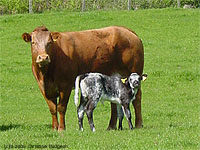Milk Fever – Slow Calving
16 March 2017 With spring calving around the corner remember that beef cows are susceptible to milk fever. Although it is more common in dairy cows, older beef cows can also be affected. Milk fever is the common term used for the signs seen in cattle when blood calcium levels are low, also known as hypocalcaemia. Blood calcium levels are normally kept under tight control by hormonal pathways. At calving however, cows’ requirements for calcium increase dramatically. This is because much more calcium is needed to produce colostrum and milk compared to that needed for a developing foetus. Although cows’ hormones will adapt to this requirement, it can take a few days. Low magnesium levels can also interfere with the release of these hormones. Older cows’ hormone responses to the increased requirement for calcium take longer which is why they are more prone to milk fever.
With spring calving around the corner remember that beef cows are susceptible to milk fever. Although it is more common in dairy cows, older beef cows can also be affected. Milk fever is the common term used for the signs seen in cattle when blood calcium levels are low, also known as hypocalcaemia. Blood calcium levels are normally kept under tight control by hormonal pathways. At calving however, cows’ requirements for calcium increase dramatically. This is because much more calcium is needed to produce colostrum and milk compared to that needed for a developing foetus. Although cows’ hormones will adapt to this requirement, it can take a few days. Low magnesium levels can also interfere with the release of these hormones. Older cows’ hormone responses to the increased requirement for calcium take longer which is why they are more prone to milk fever.
As well as being important for bones and teeth, calcium is vital for muscles to work properly. The signs of low calcium are therefore related to muscle weakness. Cows develop muscle tremors, lie down and are unable to rise. The muscles of the gut are affected, leading to a slow down in gut movements, bloat and constipation. Left untreated, if the muscles that assist breathing fail, cattle can die. The uterus is also a muscle which requires calcium to work properly. Low calcium levels can stop labour from progressing normally resulting in increased numbers of stillbirths. Low calcium levels also increase the risk of cows having retained placentae. Milk fever is treated by a vet by giving 400mls of a 40% calcium solution slowly into the vein. It is however best to prevent the condition. Supplying extra magnesium to pre-calving cows can help to reduce the incidence of milk fever. Aim to provide an extra 15g of magnesium. This can be done by feeding 150g of a good quality mineral supplement containing 10% magnesium. The magnesium supplementation required will also depend on the quality and type of forage being fed. Speak to your vet or nutritionist for herd specific advice.
Helen Carty, helen.carty@sac.co.uk
Sign up to the FAS newsletter
Receive updates on news, events and publications from Scotland’s Farm Advisory Service
